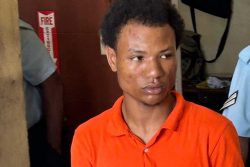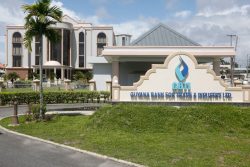President Bharrat Jagdeo announced Monday in Trinidad and Tobago that Guyana and Papua New Guinea will be co-hosting an event during the summit. Speaking during a lecture at the St. Augustine campus of the University of the West Indies (UWI), Jagdeo disclosed that Guyana has been networking with Suriname, Belize, Gabon, the Democratic Republic of the Congo and others in the run-up to Copenhagen, the Government Information Agency (GINA) reported. “We hope that we can influence what takes place in Copenhagen and this is why our model is getting so much publicity around the world,” the President was quoted as stating.
Jagdeo recalled that Britain’s Prince Charles recently spoke about Guyana’s model and said other countries are using it. In what GINA described as a well-received detailed presentation, he noted that Guyana’s Low Carbon Development Strategy (LCDS) is the only one that has advanced so far. Guyana, he said, feels it can become a very important part of the abatement solution. “We have had a long march to get where we are today…to develop the REDD (Reduced Emissions from Deforestation and Degradation) concept and to get REDD expanded to REDD Plus (avoiding deforestation, sustainable forestry management, reforestation, afforestation)”, he was quoted as saying.
Jagdeo noted that REDD Plus has been accepted as part of the United Nations lexicon and there is now significant support from the developed and developing countries for this new concept. He recalled the offer he made about three years ago to deploy this country’s forests in the cause of climate change and reiterated that to get REDD approved in a global climate change agreement, a national scale model was needed. “We are the only country that has done this so far. We have a national scale model covering the entire forest”, he stated.
The president outlined the development and central elements of the LCDS and recalled the signing last month of the memorandum of understanding with Norway which will provide US$250M to support the LCDS over the next five years, GINA reported.
According to GINA, Professor Clement Sankat, Pro Vice Chancellor and Campus Principal, said President Jagdeo has emerged as one of the Caribbean’s leading statesman – not only speaking on the matters of the environment but also over the years he has been speaking on food and agriculture production and food security for the region.
During his lecture, Jagdeo gave a detailed background on the climate change scenario noting that the solution to resolving the problem of cutting greenhouse gas emissions is quite clear – more renewable energy, greater efficiency and cutting deforestation rates around the world are needed. He noted that rainforest countries are trying to correct the “most important and glaring omission” of forests as part of the abatement solution from the Kyoto Protocol. Pointing out that deforestation generates about 20 per cent of greenhouse gases he again argued that to leave forests out of the solution would make it almost mathematically impossible to achieve the targets set for 2050. “We are trying to change that. As the first commitment period of the Kyoto Protocol comes to an end 2011-2012, the new agreement in Copenhagen must include forests as an abatement solution”, he was quoted as stating.






